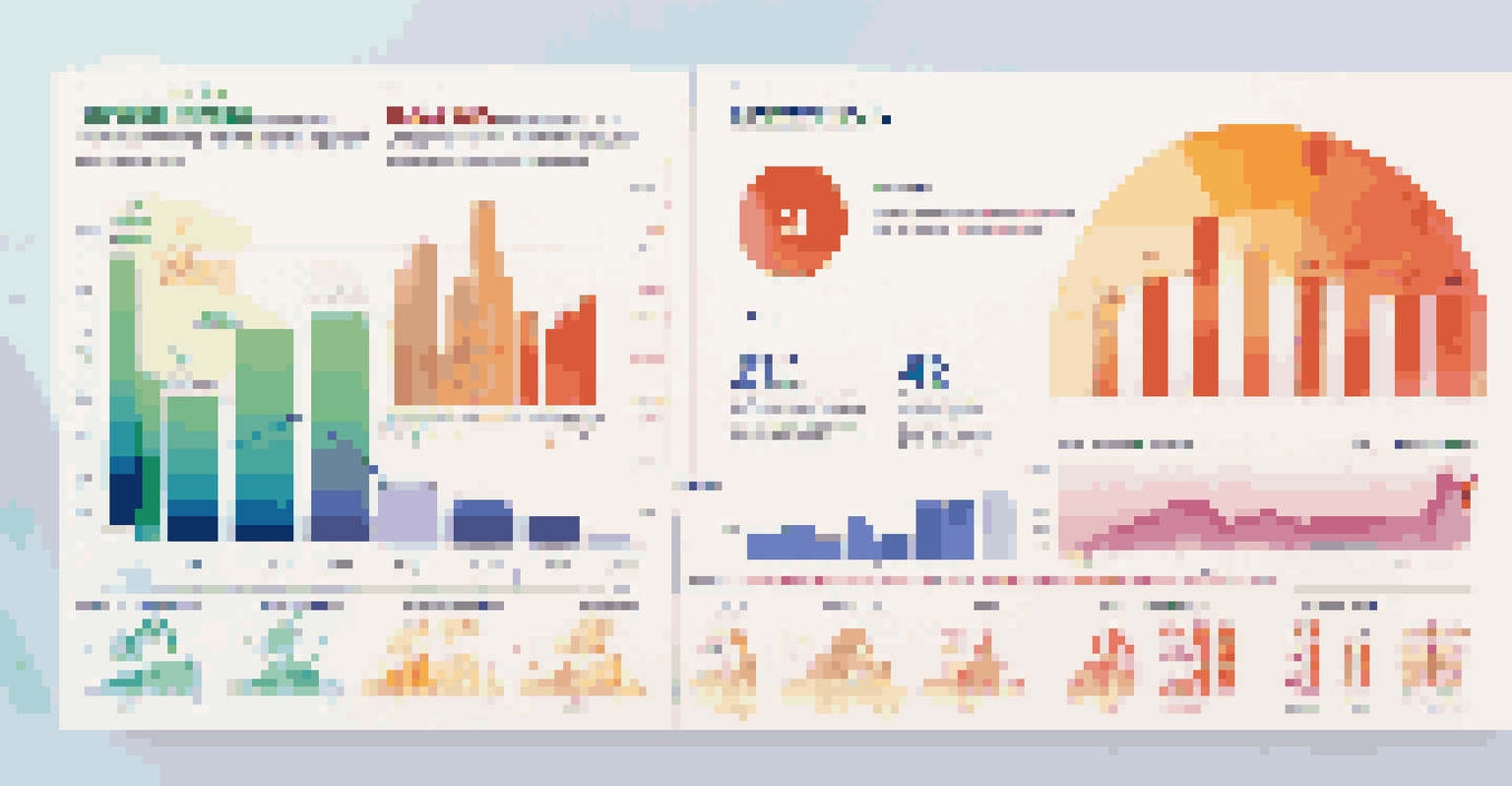The Impact of Economic Trends on B2B Marketing

Defining Economic Trends in the B2B Landscape
Economic trends refer to the general direction in which an economy is moving. For businesses, understanding these trends is crucial, especially in the B2B sector. They can encompass various indicators, such as inflation rates, employment levels, and consumer spending patterns.
In the midst of chaos, there is also opportunity.
In the B2B context, these trends can affect everything from pricing strategies to supply chain decisions. For instance, if a recession is on the horizon, companies may tighten their budgets, which directly impacts their purchasing decisions. Recognizing these signs early can provide a competitive edge.
Moreover, economic trends are not static; they evolve based on various external factors. Keeping a pulse on these changes enables B2B marketers to adapt their strategies and messaging effectively, ensuring they resonate with their target audience.
How Economic Growth Influences B2B Marketing Strategies
When an economy is experiencing growth, businesses often have more flexibility in their budgets. This expanded financial capacity can lead to increased investment in marketing and a willingness to try new strategies. B2B companies may focus on expanding their market reach or enhancing their service offerings during these robust times.

For example, a software company might launch a new product line when they observe rising demand. This can lead to aggressive marketing campaigns aimed at capturing market share. Understanding the economic climate allows marketers to align their campaigns with growth opportunities.
Economic Trends Shape B2B Strategies
Understanding economic trends is crucial for B2B marketers as these trends influence purchasing decisions and marketing tactics.
Additionally, growth periods can lead to increased competition. B2B marketers must not only invest in their offerings but also create compelling narratives that differentiate them from competitors. Crafting a unique value proposition becomes essential during these times.
The Role of Recession in Shaping B2B Marketing Tactics
Recessions bring unique challenges for B2B marketers, as companies often face budget cuts and increased scrutiny over spending. During these times, marketers must pivot their strategies to focus on value and cost-effectiveness. Emphasizing ROI in marketing messages becomes critical.
The best way to predict the future is to create it.
For instance, a consulting firm might shift its messaging to highlight how its services can save clients money or streamline operations. This approach not only addresses immediate concerns but also builds long-term trust with clients. Marketers need to reassure clients that their offerings are essential, even in tough economic times.
Moreover, during a recession, companies may prioritize their existing relationships over acquiring new clients. B2B marketers can leverage this by enhancing customer retention strategies, such as loyalty programs or personalized communication, ensuring they remain top-of-mind for current clients.
Shifts in Consumer Behavior and Their Impact on B2B Marketing
Economic trends can significantly influence consumer behavior, which in turn affects B2B marketing strategies. For example, during periods of economic uncertainty, businesses may become more cautious in their purchasing decisions. This shift requires B2B marketers to adjust their messaging and tactics accordingly.
Understanding the motivations behind these changes can help marketers create more relevant and engaging content. For instance, if businesses are prioritizing stability, marketers can highlight the reliability of their products or services. Tailoring content to reflect current consumer sentiments is key.
Adapting to Recessions is Essential
During economic downturns, B2B marketers must focus on cost-effectiveness and enhancing customer retention strategies to maintain client trust.
Additionally, economic trends can lead to the emergence of new buyer personas. As companies adapt to changing market conditions, B2B marketers must be agile enough to identify and cater to these new segments, ensuring their strategies remain effective.
The Importance of Data Analysis in Economic Trend Adaptation
In today's data-driven world, leveraging analytics is vital for understanding economic trends. B2B marketers can utilize various tools to gather insights on customer behavior, market conditions, and emerging trends. This data can inform strategic decisions and enhance marketing effectiveness.
For example, analyzing sales data during different economic phases can reveal patterns that help predict future behavior. By identifying which products or services perform better during specific economic conditions, marketers can optimize their offerings and marketing efforts.
Moreover, data analysis allows for real-time adjustments to marketing campaigns. If a sudden economic shift occurs, marketers with access to analytics can quickly pivot their strategies to respond to changing circumstances, ensuring they stay relevant and effective.
Leveraging Technology to Navigate Economic Trends
Technology plays a crucial role in how B2B marketers respond to economic trends. From AI-driven analytics to marketing automation tools, technology can provide valuable insights and streamline processes. Embracing these innovations can help companies stay ahead of the curve.
For instance, marketing automation tools can help businesses segment their audiences based on economic factors, allowing for more targeted messaging. This level of personalization can drive engagement and conversions, especially during fluctuating economic conditions.
Data Analysis Enhances Market Insights
Leveraging data analytics allows B2B marketers to identify patterns and adjust their strategies in real-time, ensuring relevance amid economic fluctuations.
Additionally, social media platforms and digital marketing channels offer real-time feedback on how campaigns are performing amid changing economic landscapes. Marketers can leverage this information to tweak their strategies, ensuring they resonate with their audience regardless of economic fluctuations.
Future Trends: Preparing for Economic Changes in B2B Marketing
Looking ahead, B2B marketers must remain vigilant and adaptable as economic landscapes continue to evolve. Anticipating future trends and preparing strategies accordingly can position businesses for success. This proactive approach is essential for navigating uncertainty.
For example, as remote work becomes more prominent, marketers may need to adjust their tactics to appeal to a more dispersed workforce. Understanding how economic trends influence workplace dynamics will enable B2B companies to create relevant offerings and marketing messages.

In summary, staying informed about economic trends and their implications can empower B2B marketers to make informed decisions. By fostering a culture of adaptability and continuous learning, businesses can thrive, even in the face of economic challenges.